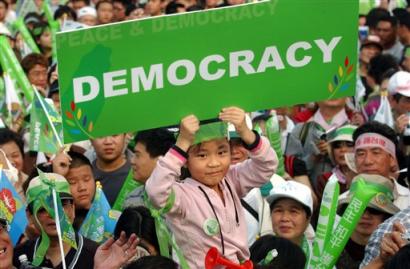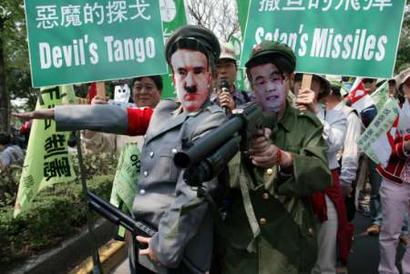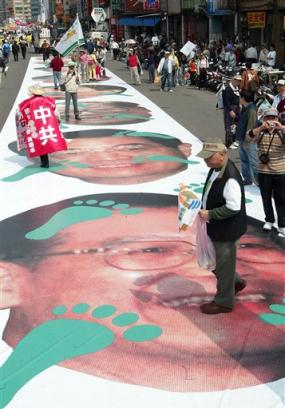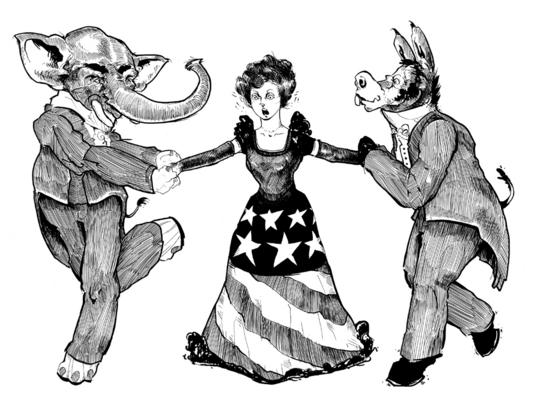
Taipei, Taiwan. No universal democratist's Saturday could be better start when this is the first image to appear on the computer screen.
Like any rapacious dictatorship, China detests the plucky self-determination of 23 million descendents of the people who in 1949 escaped Mao Tse Tung's fractured dreamchild. With a farcically named "anti-secession law," Beijing renewed its call to drown the tiny neighboring islands in a sea of red, hoping in the short term to stifle any Taipei talk of independence.
The Taiwanese know better.
They've their own opinions as to who treads on who.
The European Union will have to face more than American disapproval for its dangerous yuan-fishing:
Japan's concern about the European Union lifting its arms embargo on China will be high on the agenda when the leaders of Japan and France meet Sunday in Tokyo. "Considering stability in Asia, the United States and Japan share the awareness that resuming arms exports would be a big problem," Chief Cabinet Secretary Hiroyuki Hosoda told a Tokyo press conference Friday. "That issue is significant, and the chances are high that it will be taken up in some form" during the leaders' meeting, said Hosoda, the Japanese government's top spokesman.
Sino-sympathizers, enablers, relativists and other contrarians might be quick to dismiss Japan as Washington's errand boy; if Tokyo stands firm, they'd settle with a cynic's take on Japan's immediate regional interests, since the island nation has done business with some unsavory parties. Eventually, however, they must consider that America will no longer be the only able democracy whose patience for regimes dedicated to the violent repossession of human dignity has run out, determined to replace the policy of admission with one of prosecution.
This is the third cartoon from nearly five years ago I've chosen to publish after a bit of quiet success with the first and second.
I'm not one to conjure a "pox on both your houses," but the timeless game of courting the electorate lent itself to an amusing vignette. Besides, there's no ambivalence here: what faux Gibson Girl could turn down a fellow who's always on his toes?
It's been a busy week:
Coalition Forces from the 2nd Marine Division have detained a total of 147 suspected insurgents since taking the reins from 1st Marine Division on March 17. Since the transfer of authority, Marines from the Camp Lejeune-based division have been working to help bring about peace in the restive Al Anbar Province by detaining individuals actively terrorizing innocent civilians."Over the past few months, 1st and 2d Division... have pursued and captured many terrorists attempting to prevent a free Iraq," said Col. Bob Chase, chief operations officer for the 2d Marine Division. "These are criminals and murderers who display wanton disregard for their fellow Iraqis."
As usual, a locally significant amount of materiel was stripped from the enemy — and for their perceptive advantage Marines have no one else to thank but Iraqi security forces and citizens.
Elsewhere in-country: the website for the Iraqi Development Program, a broad-based corporate venture for reconstruction and capital improvements, boasts a frequently updated news center that includes a brief on the correct use for World Bank resources and petrol pedagogy.
Iran Free Press is reporting that Iranian "Grand Ayatollah Seyyed" Ali Khamenei has joined North Korean "Dear Leader" Kim Jong Il in defending the global consequences of online journals from the Great Unwashed.
NOT ENOUGH, MULLAHS: Scattered reports tell of Iranians having chosen the occasion of a Japan-Iran World Cup match for widespread, pro-democratic protests.
Western rightists aren't the only ones rejecting the advice of transnational organizations:
Thousands of citizens and businessmen have been protesting on the streets of several Yemeni cities against a sales tax to be enforced in July 2005. It is part of economic reforms recommended by the World Bank, which locals say will severely affect the purchasing power of the poor. The demonstrations, which took place in various governorates simultaneously, were a public outcry at the 10 percent tax on basic commodities, leaving more than 50 percent of the population economically vulnerable, according to experts....An official at the Interior Ministry accused opposition parties of exploiting the situation. ...Opposition parties deny these accusations and said the tax would increase pressure on the poor, blaming corruption for Yemen's economic woes.
"Taxation is carried out to achieve social justice, but here it is not for this purpose," Jamal al-Mutarib, a member of the [Trade and Commerce Chambers union], told IRIN.
Spoken like true free-marketeers. Yemen, a country slowly advancing in parliamentary representation towards pluralist government by consent, is plagued by yet-congealed central powers and widespread legal-economic corruption. Its workers and entrepreneurs certainly don't need their earnings and capital slipping down another chute — least not by a hyper-governmental institution known for wiring cash to those few who least deserve it.
Should Paul Wolfowitz be confirmed as President of the World Bank, as an advocate of prosperity through self-efficacy and liberalism — learning to fish to eat for a lifetime — the Deputy Secretary of Defense will have himself a corporate mission statement to revise.
Many Iraqis who know the English language and express themselves in popular weblogs are classicists, craftsmen of the metaphor, brazing thought with object. When angry, they choose to be not vulgar but graceful and poised. When meditating on thanks and remembrance, as Mohammed was yesterday, the same sight to mind:
The bad side effects of the liberation stand small when compared with what we have suffered from under Saddam's regime or when compared with what the progress that has been achieved since the liberation.Saying that the post-liberation years have brought the worst to Iraq is a mere joke and carries all the signs of mental disorders or total ignorance. I believe that those who are looking for a legal justification for the war on Saddam should take a look at the crimes that are being committed by oppressive regimes all over the world; dictators ruling with fire and steel taking legitimacy from the 'Pathetic Nations' and the international laws that bless the bloody hands of tyrants that are rejected by their desperate people. One look at Darfur can make me feel sick of all what's being said about "law and legitimacy."
...Silence and stagnation are the qualities of the helpless who would prefer pain and humiliation over the change for the better. Humanity will not evolve without daring bravery in judging and rejecting the dark past and looking forward to changing the old ways.
All new ideas and ways were fiercely fought and called the worst names but the greatness of mankind lies in its love for progress.
On this Good Friday, I remember to keep my faith first in God. Two years ago, I saw churches stand to keep Mohammed and his people in chains — out of a desire for a "peace" that would leave us in self-congratulation, insouciant to the sentence recommenced, through Saddam Hussein, on all of Iraq. What I have forgiven I will not forget.
The house of free men adopted in the nation of Iraq some of liberty's most devoted apostles, whose talents will never again be bent to the labor of the enemy of man.
LESSONS LEARNED: Syrian Ba'athists, Iranian mullahs and other totalitarians who have tried to smother Iraq's democracy will regret having only dedicated her people to the defense of their rights — if they don't already.
From the enterprising Robert Mayer, a gallery of democrats — "protest babes" — standing for their human dignity by fitting soldiers of their oppressors with flowers. One fellow quipped that leftists lost their touch when they went easy on flora and fauna.
What's more poignant in his analogy is that the jackboots in Robert's photographs are real.
In the 1960s the American left had to pretend.
Democracy's progress spares a few less despots this morning. Though a bit unwieldy, a popular uprising in Kyrgyzstan has taken the iron-fisted government by the collar. Vladimir Putin may wish to take note.
Abdullah of Jordan, who has engaged domestic reform and wooed Israel for the better part of the month, wrenched open even further the rift between liberalizing and regressing Near Eastern countries, and it appears a report noted here Tuesday evening was accurate:
Jordan's King Abdullah II launched a stinging attack against Iran, Syria and Lebanese-based militia Hezbollah as the main threats to Middle East stability. At talks with American Jewish leaders in Washington, the king said Syria and Hezbollah were encouraging Palestinian militants to wage attacks against Israel, the Haaretz and Yedioth Ahronoth newspapers reported Wednesday. Abdullah II accused Syria, Iran and Hezbollah of being "the greatest threats to stability in the Middle East," both dailies quoted him as saying.
Abdullah, a dictator, is far wiser than his counterparts in Damascus and Tehran. He appears to understand — if not reluctantly concede — inexorability and culpability, and Amman's interest in swiftly divesting itself from the autocracy business.
As Amir Taheri writes, Bashar Assad isn't the only Near East Johnny One-Note:
Where do we go from here? Islamist groups are posing now that question in the murky space they inhabit on the margins of reality. It is asked in radical mosques, touched upon in articles published by fellow-travelers and debated in the chat-rooms of militant Web sites. Beyond the usual suggestions to hijack a few more jets or poison some Western city's drinking water, the movement appears to have run out of ideas....The biggest setback for the Islamists, however, is a shift of mood in the Islamic heartland. The elections in West Bank and Gaza, Afghanistan and Iraq; Lebanon's freedom movement; the beginnings of change in Egypt, Yemen and Saudi Arabia — all have helped generate new interest in democratic reform.
Democracy: come on, everybody's doing it!
A CELL DOOR SWINGS OPEN: Via Robert Mayer, an unlawfully imprisoned Yemeni progressive — to whom attention was drawn and for whom a petition was signed — has been pardoned and freed.




